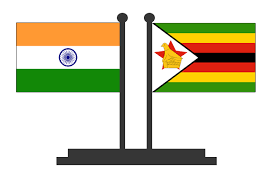
THE Embassy of India in Zimbabwe has revealed that annual bilateral trade between New Delhi and Harare has reached US$200 million, marking a significant milestone in a long-standing partnership that stretches across trade, culture, education, and development.
Indian Ambassador to Zimbabwe, Bramha Kumar, told the Zimbabwe Independent that Indian investors employed approximately 5 000 people across sectors such as food processing, mining, textiles, agricultural equipment, and polymers.
The private sector has invested an estimated US$600 million, a figure poised to grow as trade and investment between the two nations deepen.
“If you see the trend, our bilateral trade so far has been somewhere between US$150 million and US$200 million per annum. Zimbabwe is a landlocked country," Kumar said.
“So, a lot of trade also happens through third party countries. Like Zimbabwe, diamonds also go to India, but they go indirectly through other routes.
“It (trade of goods) comes from South Africa and Hong Kong. Approximately US$50 million trade does not reflect in our books. It happens through third party countries.
“We may need to prioritise streamlining these things and have a more coordinated approach so that this trade can happen directly between the two countries and new items can also be added.”
He noted that firms like ZimGold, Pure Drop, and Pepsi, through Indian investments, indirectly employ over 15 000 Zimbabweans.
- Letter from America: Is Zanu PF following the path of nationalist parties?
- Fire at India children’s hospital kills six newborns
- India-Zim bilateral ties reach US$200m
- Zim bungles drugs deal, as elite fly to India
Keep Reading
“And Varun Beverages are also planning to bring in new machines, new plants. So, by 2025 first quarter, they should be able to run more plants. That will enhance direct and indirect employment opportunities,” Kumar said.
Varun Beverages is a subsidiary of India’s Varun Beverages Limited and a significant bottling partner for PepsiCo.
Kumar said ZimGold, under the Parrogate Group, was working to bring the David Whitehead Textiles plant back to full capacity, potentially employing 2 000 to 3 000 people by the first quarter of 2025.
Parrogate Group, rooted in central India, is already well-established in Zimbabwe’s cotton, edible oils, maize, and fertiliser industries.
“What we are talking about these days are deals that have already been signed. For example, one of our public sector undertakings, Rail India Technical and Economic Service and the National Railways of Zimbabwe have entered into contract arrangements in June 2023 for the acquisition of nine locomotives and 315 wagons, valued at around US$82 million,” Kumar said.
“I hope the Ministry of Finance and Mutapa Investment Fund are working to secure funding for this project for an early implementation of this arrangement.
“Once it is done, it will be a major contribution from India in the infrastructure and connectivity sector of Zimbabwe. It will, of course, feed into the capacity of the mining sector of Zimbabwe.”
In another development, Jindal Steel and Power Group, a major Indian corporation, has signed agreements with Zesa Holdings to add 2 000 megawatts of electricity production at Hwange Thermal Power Station.
Kumar said this was a refurbished, operate and transfer model, which he hoped would happen soon.
“I hope the government of Zimbabwe is also working very expeditiously to get both of these deals implemented,” he said.
“India is looking for a continuation of meaningful contribution in Zimbabwe’s infrastructure and connectivity. It holds immense potential to enhance engagements between SMEs (small to medium enterprises) of the two countries.
“Several big companies are looking to invest in Zimbabwe’s infrastructural development. It will be good if the government of Zimbabwe interacts with Indian companies through an institutional mechanism and respond to their needs. It may be an encouraging move and may attract more Indian companies.”
Kumar said further investments from India would directly benefit Zimbabwean youths as they would be trained and employed by Indian companies.
Ends///










